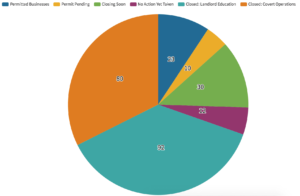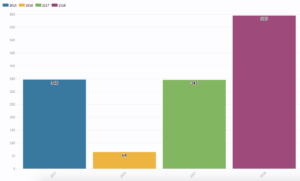Nearly four years after San Jose prioritized combating illegal massage parlors, statistics paint an unclear picture of compliance despite the controversial measure’s success in closing a vast number of businesses.
According to Lt. Paul Messier, of the San Jose Police Department’s Special Investigations Unit, there are currently 80 massage businesses remaining in San Jose. That’s down from estimates of close to 300 in 2016.
Of those 80 businesses, 23 are permitted and 10 are in the permitting process. Another 30 illicit massage businesses are suspected to close within the next several months due to successful police efforts, and about a dozen massage parlors have not yet been subject to any police enforcement efforts.
According to SJPD records, there have been 172 illicit massage businesses that have closed.


Messier said that of those 172, 92 were removed by landlord education programs and 80 stemmed from undercover operations where SJPD confirmed prostitution was occurring.
The policy dates back to 2015 when former Councilman Pierluigi Oliverio proposed a crackdown of massage parlors that are fronts for prostitution, and voted to successfully make the issue a city priority.
From that first gamble until now, Oliverio thinks his actions not only worked, but set everything in motion. The policy required massage parlor owners to obtain state licenses and maintain permits registered with SJPD.
“If I didn’t do that, we wouldn’t have had the crackdown and we wouldn’t have closed so many massage parlors,” Oliverio told San José Spotlight in a recent interview. “I heard people talk about (doing) it, but it wasn’t actually coming into something actionable.”
San Jose’s sheer number of illegal massage parlors garnered outside attention, too.
The nonprofit Polaris, which works to end human trafficking, released a report in Jan. 2018 that identified Santa Clara County as having the third highest concentration of illicit massage businesses in the United States.
Coincidentally, the Super Bowl was set to arrive in Santa Clara that year, along with its commonly correlated increase in local sex trafficking, whether statistically warranted or not. Anecdotal experiences are key pieces of identifying potential locations of illicit activity.
“The website RubMaps, which kind of caters to this industry of erotic massage, has been very helpful to us,” Messier said. “The customers are the ones who identify these places, and they leave erotic reviews for the people who work there.”
Some of these places had dozens of reviews, with select cases receiving up to 80 reviews, especially after the site Backpage – a classified advertising website that had become the largest marketplace for buying and selling sex – shut down in April 2018. Many similar sites popped up in its place.
Proving prostitution is tricky
Messier said residents who were offered sexual services when intending to get a legitimate massage also call his department with tips. However, the lieutenant emphasized that SJPD has to prove that prostitution is going on. From a legal standpoint, prostitution allegations cannot be supported only by online reviews; those have to be taken “with a grain of salt.”
In fact, he said massage parlor shutdowns are handled and tracked separately from prostitution enforcement cases. This can be seen within statistics of arrests in San Jose, which have been in flux over the last few years.
According to data requested by this news organization, 346 prostitution arrests were made in 2015. That number plummeted down to 64 in 2016, seemingly right around when massage parlor compliance efforts began. But by 2017, prostitution arrests were back up to 345, with an additional 595 occurring in 2018.


Messier said SJPD started addressing prostitution outside of massage parlors in summer 2017 by arresting both johns and prostitutes, which continued into 2018.
“The numbers are, for the most part, our street walker arrests and a very low percentage are related to hotel and massage parlor arrests,” he said.
Deception through hair, nails and photocopies
Instead of arrests, law enforcement officials deal with illegal massage businesses by shutting them down.
SJPD runs landlord education programs or covert operations related to massage parlors. Those covert operations involve an undercover officer going in and determining whether prostitution is going on. The sting operations often occur alongside code enforcement and collaborative efforts with the City Attorney.
But Messier said many businesses spring up in new locations with the same name, sell it to a family member or move to cities with less stringent requirements. Some even switch to completely different industries – such as hair, nails and, in one instance, photocopies – extensive efforts used to hide illegal activities from authorities.
Still, Messier thinks the investment in massage parlor enforcement, both in terms of time and finances, has paid off.
“I think it’s money well spent and a worthy cause,” he said. “If you go to RubMaps and if you go to Northern California, you can see what the sex buyers are saying: they can’t find any place in San Jose that offers ‘extras.’ To me, that’s how I measure our success. Even though it’s anecdotal, I think it’s very telling.”
But the fight is far from over.
“They will evolve and find a way to exist in another fashion,” Messier added. “It’s the oldest profession, as they say, so it will always be around. But it won’t be in strip malls in San Jose.”
Contact Katie Lauer at [email protected] or follow @_katielauer on Twitter.



Leave a Reply
You must be logged in to post a comment.